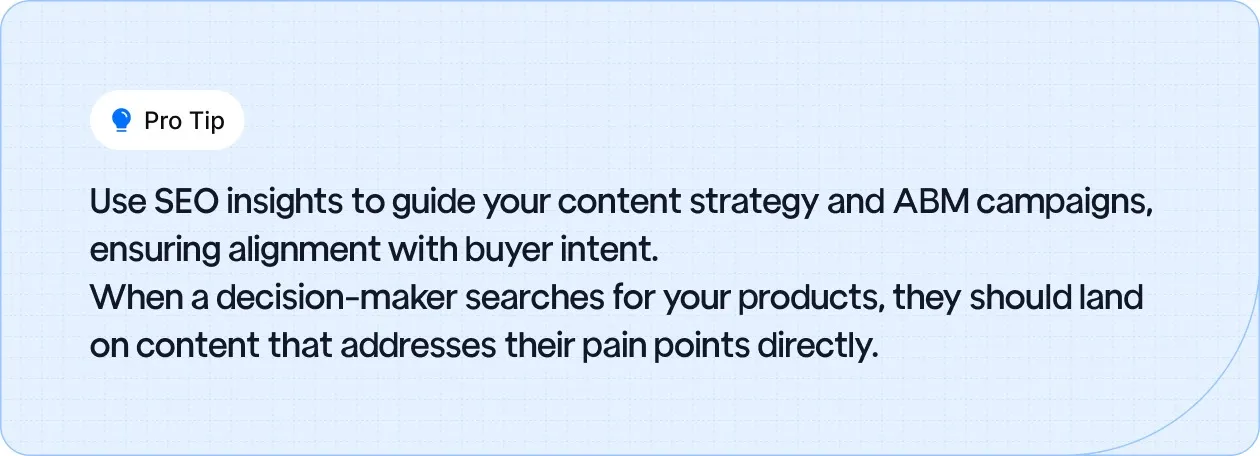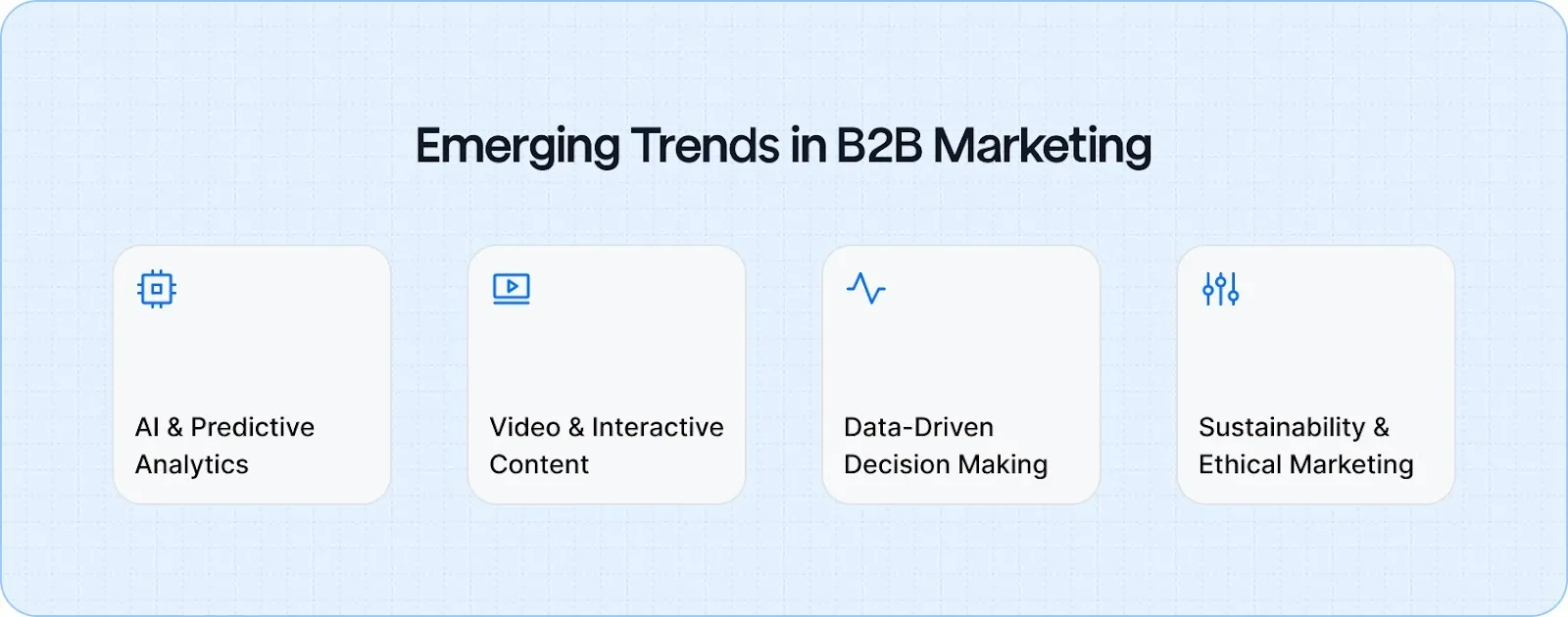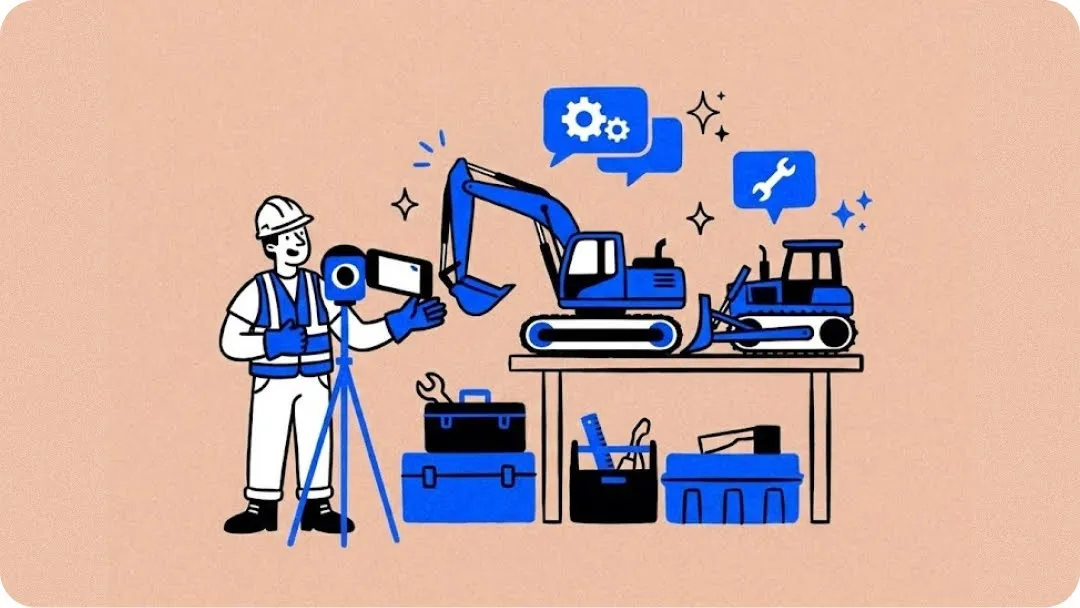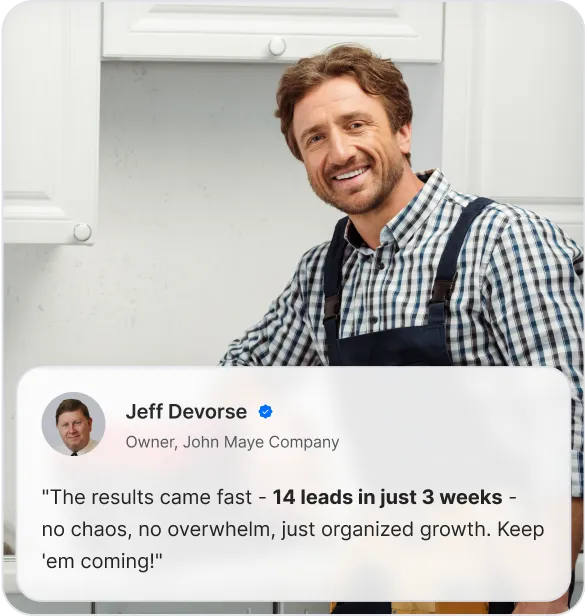As a manufacturer, you're looking for qualified leads who truly understand your products. Generic inquiries waste your time and budget, especially when you’re selling high-value machinery.
The real challenge is reaching engineers, procurement managers, and decision-makers who grasp the value of your offering and the complexities behind it.

This guide is all about helping you connect with the right buyers, the ones who know your worth, making every marketing dollar you spend count.
1. Stop Guessing, Start Planning Your Marketing Strategy
A robust marketing strategy ensures every dollar you spend drives ROI. Without one, you risk spending money on campaigns that generate low-quality leads and ultimately waste resources.
Why it matters: Businesses with a documented strategy are 414% more likely to achieve success. For manufacturers, this is about finding the right buyers who understand the complexity of your products and can justify high-value purchases.
Key components:
- Market Research & Competitor Analysis: Understand your market dynamics and what your competitors are doing. Know who your buyers are, where they are, and how they make purchasing decisions.
- Buyer Personas & Target Segmentation: Define the specific needs of your target audience. For manufacturers, this might mean creating personas for procurement managers or engineering decision-makers who value precision over price.
- KPI Definition & Reporting Frameworks: Track the right metrics. For example, monitor lead conversion rates for high-value accounts and focus on customer lifetime value instead of just traffic.
Pro tip: Regularly revisit your strategy to stay aligned with changing buyer behaviors and market trends. What worked last quarter might not work this quarter, so adapt as you go.
2. Your Brand Isn’t Boring, Let’s Prove It
Strong branding communicates your value proposition and industry expertise, setting you apart from the competition. For manufacturers, this is about conveying technical credibility, reliability, and understanding of your industry's demands.
Users on Reddit also highlight that a unique, memorable brand name can make your company stand out, be easy to remember, and legally protectable, reinforcing the importance of a thoughtful brand identity.
Why it matters: 62% of B2B buyers say brand reputation impacts purchase decisions.
A solid, trustworthy brand helps decision-makers feel confident in making high-value, long-term purchases.
Key services:
- Brand Messaging & Tone of Voice: Your messaging should reflect the technical nature of your business.
For example, use language that speaks to engineers’ and procurement professionals’ concerns, like precision, quality control, and custom solutions.
- Visual Identity (Logos, Color Palette, Typography): A professional, cohesive brand identity ensures your business stands out as credible and trustworthy in a competitive space.
Rebranding Campaigns for Growth or Market Repositioning: Entering a new market segment or expanding globally, a rebrand can shift perception and attract the right customers.

3. Content That Talks Shop (And Gets You Leads)
Content is the lifeblood of B2B marketing. For manufacturers, content serves as the bridge between your complex products and the decision-makers who need them. It positions your business as a thought leader and drives demand for your solutions.
Formats: Blog posts, white papers, ebooks, webinars, case studies, and videos. These formats help you explain intricate details, showcase success stories, and engage technical buyers.
Pro tip: Use SEO-optimized content to capture organic leads while delivering value to decision-makers in your target accounts.
Focus on content that addresses the specific challenges of your audience, such as long sales cycles or complex purchasing decisions.
Must Read: Overcome Manufacturing Marketing Challenges Holding You Back
4. Be Found Before Your Competitors, SEO for the Real World
For manufacturers, SEO ensures that your business is discoverable when potential buyers are actively searching for your type of products, services, and solutions.
Best practices:
- On-page SEO: Target specific keywords relevant to your industry, like custom metal fabrication, precision CNC machining, or high-quality industrial equipment.
- Off-page SEO: Focus on gaining backlinks from reputable industry sites to build authority.
- Technical SEO: Ensure your website is mobile-optimized, loads quickly, and delivers a smooth user experience, crucial for decision-makers who are browsing for detailed product specifications.

5. Get Social Media Right Without Feeling Awkward
Social media is a vital tool for B2B marketers looking to connect with industry professionals. LinkedIn, Twitter, and industry forums are all powerful platforms for building brand awareness, sharing expertise, and driving leads.
Pro tip: Focus on high-quality posts, engagement, and social listening rather than vanity metrics like likes or followers. Build relationships, participate in discussions, and position your company as an authority in your industry
6. Send Emails That Get Noticed, Not Sent to the Trash
Email remains one of the highest ROI channels in B2B marketing, with an average ROI of $42 for every $1 spent. But it’s about sending the right emails to the right decision-makers.
Effective tactics:
- Personalized drip campaigns for lead nurturing
- Segment emails based on industry, job role, and stage in the funnel
- Automated follow-ups for abandoned inquiries or content downloads

7. Paid Ads That Target the Right Machines and People
Paid campaigns complement organic efforts by driving highly qualified traffic to your website. LinkedIn Ads for targeted outreach and Google Ads for search-based intent ensure the right decision-makers see your business.
Top channels for B2B:
- LinkedIn Ads for precise targeting by job title, industry, or company size
- Google Ads for intent-driven searches
- Retargeting campaigns to re-engage website visitors
Also Read: Can Google Ads Drive More Leads and Sales for Your Manufacturing Business?
8. Leads That Aren’t Just Names on a Spreadsheet
The goal of B2B marketing is to generate qualified leads. Manufacturers need leads who understand the value of your high-ticket products and can make informed purchasing decisions.
Services include:
- Lead scoring & segmentation
- Drip campaigns & automated workflows
- Multi-channel nurturing across email, social, and content

9. Account-Based Marketing: Your High-Value Clients Deserve VIP Treatment
ABM focuses marketing efforts on high-value target accounts, treating each as a market of one. By tailoring your efforts to key accounts, you can increase your conversion rates and ROI.
Why it works: 81% of B2B marketers say ABM delivers higher ROI than other marketing strategies.
Key tactics:
- Personalized content for each decision-maker
- Multi-channel campaigns (email, LinkedIn, direct mail)
- Close alignment with sales for seamless execution
Pro tip: Use data-driven insights to prioritize accounts with the highest revenue potential, ensuring you’re focusing your resources where they matter most.
Also Read: B2B Manufacturer Marketing Strategies That Generate Leads
10. Automate the Boring Stuff, Keep the Smart Stuff Human
Marketing automation helps B2B teams manage campaigns, nurture leads, and track results without manual overhead. This allows your team to focus on strategic initiatives while automation handles repetitive tasks.
Common automation tools:
- CRM integration (HubSpot, Salesforce)
- Email and workflow automation
- Analytics dashboards for campaign performance
Pro tip: Start small with high-impact tasks like email nurturing and lead scoring before scaling across all marketing channels.
Emerging Trends in B2B Marketing

Stay ahead by integrating these key trends into your marketing strategy:
AI & Predictive Analytics: Personalize at Scale
AI and predictive analytics help manufacturers predict buyer behavior and personalize campaigns. Use insights to target high-value leads and optimize your messaging for maximum ROI.
Interactive Content: Engage and Convert
Interactive demos simplify complex products, boost engagement, and increase conversion rates. Use video to showcase your products’ features and highlight real-world applications.
Data-Driven Decision Making: Align Sales & Marketing
Leverage shared dashboards to integrate sales and marketing data, ensuring both teams are aligned on KPIs and working towards common goals. Real-time insights help optimize campaigns and improve conversion rates.
Sustainability & Ethical Marketing: Build Trust with Values
Highlight your commitment to sustainability and ethical practices to resonate with today's B2B buyers, who are increasingly evaluating suppliers on social responsibility.
By integrating these trends, manufacturers can optimize their marketing strategies, build trust, and engage the right buyers effectively.
Transform Your B2B Marketing and Drive Real Results Today
B2B marketing is about building lasting relationships, establishing your authority, and driving measurable revenue.
By implementing these 10 essential services and staying ahead of emerging trends, you can create a scalable, high-performing marketing engine that fuels growth.
If you're tired of relying on outdated strategies or wasting resources on ineffective tactics, it's time to make a change.
Gushwork specializes in solving the unique challenges of B2B manufacturing marketing, helping businesses like yours streamline efforts and accelerate growth with personalized, high-impact solutions.
FAQs
Q1. What are the key marketing strategies for manufacturers in B2B?
A1. Manufacturers can benefit from a blend of strategies, including Account-Based Marketing (ABM), SEO, content marketing, and data-driven campaigns. A robust marketing strategy ensures manufacturers engage the right decision-makers, build brand credibility, and drive qualified leads.
Q2. How can SEO help manufacturers in B2B marketing?
A2. SEO helps manufacturers ensure their business is discoverable by potential buyers when they are actively searching for products and services. Best practices for manufacturers include optimizing for industry-specific keywords, improving website performance, and building backlinks from reputable sites.
Q3. Why is content marketing important for B2B manufacturers?
A3. Content marketing allows manufacturers to position themselves as industry leaders by educating their audience on the complexities of their products. Formats like case studies, whitepapers, and videos help engage decision-makers and drive demand for high-value products.
Q4. How does Account-Based Marketing (ABM) work for manufacturers?
A4. ABM allows manufacturers to focus marketing efforts on high-value target accounts. It involves personalized messaging and campaigns tailored to key decision-makers, increasing the chances of converting leads into long-term clients.
Q5. What role does branding play in B2B marketing for manufacturers?
A5. Strong branding helps manufacturers differentiate themselves from competitors and build trust with potential clients. A solid brand communicates industry expertise, reliability, and the technical precision that B2B buyers value when making purchasing decisions.
Q6. How can social media marketing be effective for manufacturers?
A6. Social media platforms like LinkedIn allow manufacturers to showcase their expertise, engage with industry professionals, and share valuable content. It’s important to focus on high-quality engagement rather than vanity metrics, helping to build a network of qualified leads.
Q7. What are the benefits of marketing automation for manufacturers?
A7. Marketing automation helps manufacturers streamline processes, nurture leads, and track results without manual overhead. Tools like CRM integration and email automation allow for personalized messaging at scale, ensuring timely engagement with prospects and reducing manual work.





















.webp)








.webp)
.svg)


.svg)
.svg)
.svg)




.svg)


